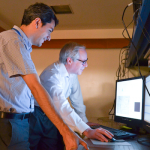Investigating Immunotherapy: Cancer Breakthrough Leads to Startup
By Jocelyn Anderson

Chiao-Jung Kao
UC Davis researchers are exploring novel immunotherapy strategies with the goal of developing targeted treatment for cancer patients.
Cancer immunotherapy — harnessing the innate powers of the patient’s own immune system to fight the disease — dates back to as early as the 1890s, when one doctor discovered that bacterial infections could stimulate an immune system response that could also trigger cancer remission. More recently, the field has expanded, with new research supporting treatments that either stimulate or restore the immune system. For example, cancer vaccines are designed to make the person’s immune system more effectively attack cancer cells. Advantages include high specificity and relatively low toxicity.
Results from a new study, published in July in Cancer Immunology Research, suggest that monitoring immune status may be necessary to optimize treatment regimens combining immunotherapy with chemo-radiotherapy.
“Immunotherapy is poised to become the standard of care for many cancers,” said Chiao-Jung Kao, assistant adjunct professor in the Department of Obstetrics and Gynecology and lead author of the paper. “In the past, cancer immunotherapies such as cancer vaccines have been combined with chemotherapy with limited success.”
Kao is part of a research team led by Michael DeGregorio, professor of medicine, in the Division of Hematology and Oncology Research within the Department of Internal Medicine at UC Davis.
The team describes key differences in the effects of chemo-radiotherapy on biomarkers of immune response following two commonly employed treatment regimens in a lung cancer mouse model. While the paper focuses on lung cancer, the findings may be applied to other cancer types.
“To our knowledge, this is the first clear demonstration in a preclinical mouse model that serial monitoring of a patient’s immune status can be critical when using cancer immunotherapy,” said Kao.
Additionally, the researchers are testing several small molecule drug candidates for their ability to boost the immune system. Such drug modulators could potentially enhance the effectiveness of cancer immunotherapy. The lead proprietary compound, with the code name IMT-325, has shown promising activity in both in vitro and in vivo preclinical studies.
“Our approach is to monitor immune status of cancer patients and fortify the immune system with an immune modulator for the purpose of optimizing personalized cancer immunotherapies,” said DeGregorio.
A modulator would help regulate the immune system. Though the precise mechanism of action is still not widely understood, immune modulators currently are used to control some ailments like Crohn’s disease. Researchers also are investigating a connection to cancer.
The same team made news a year ago with a potential lung cancer vaccine that shows promise for boosting immune response and reducing the number of tumors in mice with lung cancer. They now believe a drug modulator they are developing could improve the vaccine’s effect.
Both projects have been supported by Germany-based pharmaceutical company Merck KGaA.
With the discovery of this new therapeutic approach, DeGregorio and his team formed a startup focused on commercializing the therapy. (DeGregorio and Kao are scientific advisors to the new venture.) The company, called ImmunoTess, was founded in May and has already raised more than $1 million and filed two provisional patent applications.
The UC Davis Office of Research helps university scientists like DeGregorio and Kao, turn their breakthroughs into commercial products, either through established corporate partners or the formation of startup companies. Such new ventures are facilitated by the Office of Corporate Relations and InnovationAccess, units within the Technology Management & Corporate Relations division. University startup formation is facilitated by Venture Catalyst, also within TMCR. Venture Catalyst and InnovationAccess worked closely with the founders of ImmunoTess throughout the entire process, from offering expertise on forming the new venture to filing provisional patents and licensing the technology to the company. Venture Catalyst’s START program also provided a suite of services designed specifically to help grow technology startups. UC Davis has an equity stake in ImmunoTess.
“InnovationAccess and Venture Catalyst are immensely helpful resources for faculty members like myself who are motivated to move our research beyond the laboratory into clinical benefit for patients,” said DeGregorio. “The success of ImmunoTess in delivering treatments to patients suffering from cancer will benefit from this continued collaboration.”
DeGregorio has more than 30 years of experience in drug development research, and is one of the inventors of two drugs approved by the U.S. Food and Drug Administration. Most notably, he developed Osphena, which was approved for women by the FDA in 2013 to treat dyspareunia, pain during sexual intercourse most often associated with menopause. It was approved by the European Medicines Agency in 2015 for the treatment of vulvar and vaginal atrophy in postmenopausal women. The drug also has potential use in breast cancer for preventing bone loss and treating quality-of-life issues in breast cancer survivors.
With this newest venture, DeGregorio plans to assemble a regulatory and clinical research team and potentially partner with one or more pharmaceutical companies to allow for further development of immunotherapies.
“As a serial innovator, Dr. DeGregorio has a strong track record of transforming his research into positive quality of life impact through its commercialization,” said Dushyant Pathak, associate vice chancellor for Technology Management and Corporate Relations. “Partnering with him in the success of ImmunoTess is an example of how UC Davis supports the formation of companies and facilitates their success in commercializing university technologies for societal benefit and economic impact.”





